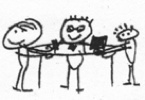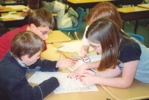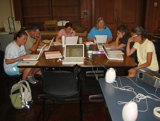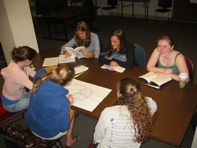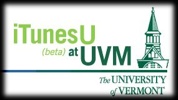Dewey’s way of placing human activity at the center of his theorizing has always been inspirational to me. I assembled a list of quotes that I sometimes have students read when we visit his memorial at UVM. They continue to ring so true. Here they are, in honor of his birthday, October 20, 1859. Burlington, VT.
Quotes: John Dewey
1859-1952
Democracy and Education, 1925
Experience and Education, 1928
Schools of Tomorrow, 1915
*1. Social control of individuals rests upon the instinctive tendency of individuals to imitate or copy the actions of others. The latter serve as models. The imitative instinct is so strong that the young devote themselves to conforming to the patterns set by others and reproducing them in their own scheme of behavior. 40 d&e
*2. We do not have to draw out or educe positive activities from a child, as some educational doctrines would have it. Where there is life, there are already eager and impassioned activities. Growth is not something done to them; it is something they do. 50 d&e
*3. Emphasis upon the value of the early experiences of immature beings is most important, especially because of the tendency to regard them as of little account. But these experiences do not consist of externally presented material, but of interaction of native activities with the environment which progressively modifies both the activities and the environment. 93 d&e
*4. In order to have a large number of values in common, all the members of the group must have an equitable opportunity to receive and to take from others. There must be a large variety of shared undertakings and experiences. Otherwise, the influences which educate some into masters, educate others into slaves. And the experience of each party loses in meaning when the free interchange of varying modes of life experience is arrested. A separation into a privileged and a subject class prevents social interchange. 98 d&e
5. The evils thereby affecting the superior class are less material and less perceptible, but equally real. Their culture tends to be sterile, to be turned back to feed on itself; their art becomes a showy display and artificial; their wealth luxurious; their knowledge overspecialized; their manners fastidious rather than humane. 98 d&e
*6. Upon the educational side, we note first that the realization of a form of social life in which interests are mutually interpenetrating, and where progress, or readjustment, is an important consideration, makes a democratic community more interested than other communities have cause to be in deliberate and systematic education. …Since a democratic society repudiates the principle of external authority, it must find a substitute in voluntary disposition and interest; these can be created only by education. 101 d&e
7. It also follows that all thinking involves a risk. Certainty cannot be guaranteed in advance. The invasion of the unknown is of the nature of an adventure; we cannot be sure in advance. The conclusions of thinking, till confirmed by the event, are, accordingly, more or less tentative or hypothetical. Their dogmatic assertion as final is unwarranted, short of the issue, in fact. 174 d&e
*8. Study of mental life has made evident the fundamental worth of native tendencies to explore, to manipulate tools and materials, to construct, to give expression to joyous emotion, and so on. When exercises which are prompted by these instincts are a part of the regular school program, the whole pupil is engaged, the artificial gap between life in school and out is reduced, motives are afforded for attention to a large variety of materials and processes distinctly educative in effect, and cooperative associations which give information a social setting are provided. 228 d&e
9. Regarding freedom, the important thing to bear in mind is that it designates a mental attitude rather than external unconstraint of movements, but that this quality of mind cannot develop without a fair leeway of movements in exploration, experimentation, application, and so on. 357 d&e
*10. A primary responsibility of educators is that they not only be aware of the general principle of the shaping of actual experience by environing conditions, but that they also recognize in the concrete what surroundings are conducive to having experiences that lead to growth. Above all, they should know how to utilize the surroundings, physical and social, that exist so as to extract from them all that they have to contribute to building up experiences that are worthwhile. Traditional education did not have to face this problem; it could systematically dodge this responsibility. 40 e&e
11. I am not romantic enough about the young to suppose that every pupil will respond or that any child of normally strong impulses will respond on every occasion. There are likely to be some who, when they come to school, are already victims of injurious conditions outside of the school and who have become so passive and unduly docile that they fail to contribute. There will be others who, because of previous experiences, are bumptious and unruly and perhaps downright rebellious. But it is certain that the general principle of social control cannot be predicated upon such cases. It is also true that no general rule can be laid down for dealing with such cases. The teacher will have to deal with them individually. 56 e&e
*12. It is not enough to insist upon the necessity of experience, nor even of activity in experience. Everything depends upon the quality of the experience which is had. …Hence, the central problem of education based upon experience is to select the kind of present experiences that live fruitfully and creatively in subsequent experiences. 28 e&e
13. Education which ignores this viral impulse furnished by the child, is apt to be “academic,” “abstract,” in the bad sense of such words. If textbooks are used as the sole material, the work is much harder for the teacher, for besides teaching everything herself she must constantly repress and cut off the impulses of the child toward action. 73 sot
14. No book or map is a substitute for personal experience; they cannot take the place of the actual journey. The mathematical formula for a falling body does not take the place of throwing stones or shaking apples from a tree. 74 sot
15. In another building all the pupils above the fourth grade have organized into civic clubs. They divided the school district into smaller districts and one club took charge of each district, making surveys and maps of their own territory, counting lamp posts, alleys, and garbage cans, and the number of policemen, or going intensively into the one thing which interested them most. They each club decided what they wanted to do for their own district and set out to accomplish it, whether it was the cleaning up of a bad alley or the better lighting of a street. 82 sot
16. A truly scientific education can never develop so long as children are treated in the lump, merely as a class. Each child has a strong individuality, and any science must take stock of all the facts in its material. Every pupil must have a chance to be who he truly is, so that the teacher can find out what he needs to make him a complete human being. 137 sot
17. But if every pupil has an opportunity to express himself, to show what are his particular qualities, the teacher will have material on which to base her plans of instruction. Since a child lives in a social world, where even the simplest act or word is bound up with the words and acts of his neighbors, there is no danger that this liberty will sacrifice the interests of others to caprice. Liberty does not mean the removal of the checks which nature and man impose on the life of every individual in the community. 138 sot
*18. We send children to school supposedly to learn in a systematic way the occupations which constitute living, but to a very large extent, the schools overlook, in the methods and subject-matter of their teaching, the social basis of living. Instead of centering the work in the concrete, the human side of things, they put the emphasis on the abstract, hence the work is made academic – unsocial. 165 sot
*19. There are three things about the old-fashioned school which must be changed if schools are to reflect modern society: first, the subject-matter, second, the way the teacher handles it, and third, the way the pupils handle it. 170 sot
20. Our world has been so tremendously enlarged and complicated, our horizons so widened and our sympathies so stimulated, by the changes in our surroundings and habits brought about by machinery, that a school curriculum which does not show this same growth can be only very partially successful. The subject-matter of the schoolroom must be enlarged to take in the new elements and needs of society. 171 sot
*21. Hence, the daily experiences of the child, his life from day to day, and the subject matter of the schoolroom, are parts of the same thing; they are the first and last steps in the life of a people. To oppose one to the other is to oppose the infancy and maturity of the same growing life; it is to set the moving tendency and the final result of the same power over against each other; it is to hold that the nature and the destiny of the child war with each other. 71 sot
*22. It is fatal for a democracy to permit the formation of fixed classes. Differences of wealth, the existence of large masses of unskilled laborers, contempt for work with the hands, inability to secure the training which enables one to forge ahead in life, all operate to produce classes, and to widen the gulf between them. …The only fundamental agency for good is the public school system. Every American is proud of what has been accomplished in the past in fostering among very diverse elements of population a spirit of unity so that the sense of common interests and aims has prevailed over the strong forces working to divide our people into classes. 314 sot
